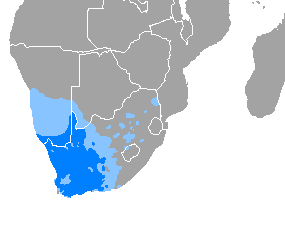Afrikaans leid
From Wikipedia, the free encyclopedia
Afrikaans is a Wast Germanic leid, mainly spoken in Sooth Africae and Namibie. It is a dochter leid o Dutch, oreeginatin in its 17t century dialects, collectively referred tae as Cape Dutch.[n 1] Awtho Afrikaans borraed frae leids sic as Malay, Portuguese, the Bantu leids or the Khoisan leids, an estimatit 90 tae 95 percent o Afrikaans vocabulary is o Dutch origin.[n 2]
| Afrikaans | |
|---|---|
| Pronunciation | [afriˈkɑːns] |
| Native tae | Sooth Africae, Namibie |
| Ethnicity | Afrikaners, Cape Coloured |
Native speakers | 7.2 million (2016)[1] 10.3 million L2 speakers in Sooth Africae (2002)[2] |
Indo-European
| |
| |
Signed forms | Signed Afrikaans[3] |
| Offeecial status | |
Offeecial leid in | Sooth Africae |
Recognised minority leid in | |
| Regulatit bi | Die Taalkommissie |
| Leid codes | |
| ISO 639-1 | af |
| ISO 639-2 | afr |
| ISO 639-3 | afr |
| Glottolog | afri1274[4] |
| Linguasphere | 52-ACB-ba |
 Regions shadit daurk blue represent auries o concentratit Afrikaans-speakin commonties | |
Wi aboot 6 million native speakers in Sooth Africae, or 13.3 percent o the population, it is the third maist spoken mither tongue in the kintra.[5][6] It haes the widest geographical an racial distribution o aw offeecial leids, an is widely spoken an unnerstood as a seicont or third leid.[n 3] It is the majority leid o the wastren hauf o Sooth Africae—the provinces o the Northren Cape an Wastren Cape—an the primary leid o the coloured an white communities.[n 4] In neebourin Namibie, Afrikaans is spoken in 11 percent o hoosehaulds, mainly concentratit in the caipital Windhoek an the soothren regions o Hardap an Karas.[n 5] Widely spoken as a seicont leid, it is a lingua franca o Namibie.[n 6]
While the tot nummer o speakers o Afrikaans is unkent, estimates range atween 17.5 an 23 million.[n 7]
Grammar
In the grammar o Afrikaans, thare's nae sindry atween the infinitive an praisent forms o verbs, wi the exception o the verbs 'to be' and 'to have':
| infinitive form | present indicative form | Dutch | Scots | German |
|---|---|---|---|---|
| wees | is | zijn (imperative: wees) | be | sein |
| hê | het | hebben | hae | haben |
An aw, verbs dinna conjugate differently depending on the subject. For ensaumple,
| Afrikaans | Dutch | Scots | German |
|---|---|---|---|
| ek is | ik ben | A am | ich bin |
| jy/u is | jij/u bent | you/ye are (sing.) | du bist (informal sing.) |
| hy/sy/dit is | hij/zij/het is | he/she/it is | er/sie/es ist |
| ons is | wij zijn | we are | wir sind |
| julle is | jullie zijn | you/ye are (plur.) | ihr seid (informal pl.) |
| hulle is | zij zijn | thay are | Sie (formal sing. & pl.)/sie sind |
References
Wikiwand - on
Seamless Wikipedia browsing. On steroids.
